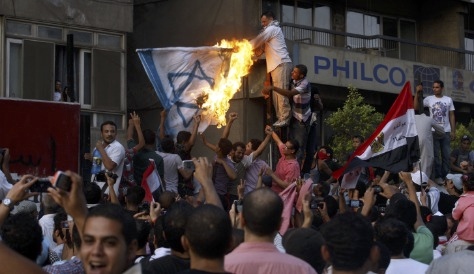Da Haaretz del 10.9.2011: l’assalto all’ambasciata d’Israele al Cairo, un morto, 450 feriti, il personale israeliano (80 persone) evacuato. L’aggressione dopo un incidente di frontiera in cui sono morti cinq1ue poliziotti egiziani. Gli incidenti sono seguiti all’attentato ad Eillat in agosto. Ecco Haaretz di oggi:
- Published 11:08 10.09.11
- Latest update 11:08 10.09.11
Israeli diplomatic staff and families evacuated after Egyptians storm embassy in Cairo
Egyptian commando unit releases 6 besieged Israeli Embassy guards, IAF evacuates diplomats and families from Cairo in the wake of embassy break in; Israeli official calls attack a ‘blow to peaceful relations’ between the two countries.
By Barak Ravid, Jack Khoury and The Associated Press
An Egyptian commando unit released six besieged security guards from the Israeli Embassy, while an Israeli Air Force plane evacuated over 80 diplomats, including family members from Cairo, after a mass group of Egyptian protesters broke into the embassy, late Friday night.
Prime Minister Benjamin Netanyahu and Foreign Minister Avigdor Lieberman decided to go forth with the evacuation after it became clear that Egyptian security forces had lost control of a protest that began outside the Israeli Embassy, and quickly escalated into a breach of the embassy’s security system.
After breaking in, the protesters dumped hundreds of documents out of the windows after a day of demonstrations outside the building in which crowds swinging sledge hammers and using their bare hands tore apart the embassy’s security wall.
Just before midnight, a group of protesters reached a room on one of the embassy’s lower floors at the top of the building and began dumping Hebrew-language documents from the windows, said an Egyptian security official who spoke on condition of anonymity because he was not authorized to speak to the media.
Protesters clashed with police and set fire to two police truck outside the embassy. Crowds also tried to attack a nearby police station but were turned back by security forces firing tear gas and warning shots. State radio reported that one person died of a heart attack and that 450 people were injured.
Meanwhile, a senior Israeli official on Saturday denounced an overnight attack on his country’s embassy in Egypt as a “grave violation” of diplomatic norms and a “blow to peaceful relations” between the two countries. Egypt has put its police force on a state of alert after the overnight violence.
Israel’s ambassador, Yitzhak Levanon, along with his family and other embassy staff rushed to Cairo airport and left on a military plane for Israel, said airport officials who spoke on condition of anonymity because they were not authorized to speak to the media.
In Jerusalem, an Israeli official confirmed the embassy had been broken into, saying it appeared the group reached a waiting room on the lower floor. He spoke on condition of anonymity because he was not permitted to release the information.
No one answered the phone at the embassy late Friday.
Several large protests have taken place outside the embassy in recent months without serious incident. Friday’s demonstration, however, quickly escalated with crowds pummeling the security wall with sledge hammers and tearing away large sections of the cement and metal barrier, which was recently put up to better protect the site from protests.
For the second time in less than a month, protesters were able to get to the top of the building and pull down the Israeli flag.
Crowds outside the building photographed documents that drifted to the ground and posted some of them online.
Senior Israeli officials were holding discussions on the embassy breach.
Israeli Defense Minster Ehud Barak said in a statement that he also spoke with his American counterpart, Leon Panetta, and appealed to him to do what he could to protect the embassy.
Thousands elsewhere protested for the first time in a month against the country’s military rulers.
Seven months after the popular uprising that drove Mubarak from power, Egyptians are still pressing for a list of changes, including more transparent trials of former regime figures accused of corruption and a clear timetable for parliamentary elections.
Egyptians have grown increasingly distrustful of the Supreme Council of the Armed Forces, which took control of the country when Mubarak was forced out on Feb. 11 after nearly three decades in power. The council, headed by Mubarak’s defense minister, Field Marshall Hussein Tantawi, has voiced its support for the revolution and those who called for democracy and justice.
But activists accuse it of remaining too close to Mubarak’s regime and practicing similarly repressive policies, including abusing detainees. The trials of thousands of civilians in military courts has also angered activists.
“In the beginning we were with the military because they claimed to be protectors of the revolution, but month after month nothing has changed,” said doctor Ghada Nimr, one of those who gathered in Tahrir Square.
One banner in Cairo read, “Egyptians, come out of your homes, Tantawi is Mubarak.”
Demonstrators in Cairo also converged on the state TV building, a central courthouse and the Interior Ministry, a hated symbol of abuses by police and security forces under Mubarak. Protesters covered one of the ministry’s gates with graffiti and tore off parts of the large ministry seal.
Protests also took place in Alexandria, Suez and several other cities.
About 850 people were killed in the early days of the Jan. 25-Feb. 11 uprising. Tantawi is scheduled to testify in Mubarak’s trial in closed sessions that begin Sunday. The 83-year-old Mubarak is on trial on charges of complicity in the deaths of protesters, a charge that could bring the death penalty.
The judge in the trial banned TV cameras from the courtroom during this week’s sessions, and starting Sunday the proceedings will be closed to the media and the public.
The lack of transparency in trials of members of Mubarak’s inner circle has angered many in Egypt.
“These are all practices of the old regime: repression and restriction on freedoms,” said Cairo protester Khaled Abdel-Hamid.


